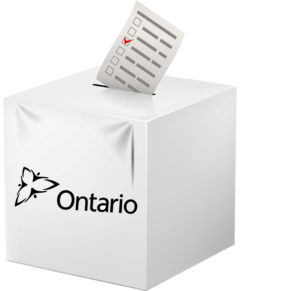The Centre for Israel and Jewish Affairs (CIJA) and B’nai Brith Canada are calling on members of Ontario’s Jewish community to get active, in advance of the June 7 provincial election – and they’ve suggested several issues to consider when casting a ballot.
CIJA published a glossy 16-page election guide, outlining five priority issues that it says are important to the Jewish community. It is calling on voters to discuss the issues with their friends and to query the candidates about them. They include: “combating anti-Semitism,” “supporting the most vulnerable,” “improving community security,” “expanding Ontario-Israel trade ties” and “preventing genetic discrimination” (especially when it comes to applying for insurance policies).
The issues that B’nai Brith thinks are relevant to the grassroots Jewish community are “hate crimes,” “educational fairness,” “affordable housing,” “campus anti-Semitism” and “initiatives to assist people living with disabilities.”
B’nai Brith said it would raise those five key issues at election debates that it is co-sponsoring, along with three synagogues, in ridings with substantial Jewish populations. They include Eglinton-Lawrence (May 22 at Shaarei Shomayim Synagogue), Thornhill (May 23 at Chabad Flamingo) and Willowdale (May 24 at Beth Tivkah Synagogue).
READ: HOW WILL JEWISH ONTARIANS CAST THEIR BALLOTS?
A fourth debate involving the candidates in York Centre, which was scheduled to take place on May 16 at Beth David Synagogue, was cancelled when some of the candidates pulled out at the last minute, said Aidan Fishman, national director of B’nai Brith’s League for Human Rights.
On one of the issues where the two organizations overlap – addressing anti-Semitism – CIJA suggested that candidates be asked if they support Ontario adopting the definition set by the International Holocaust Remembrance Alliance (IHRA). That organization’s definition of anti-Semitism includes calls for violence against Jews, Holocaust denial and rhetoric that dehumanizes or demonizes Jews.
The definition also includes “denying the right of the Jewish people to self-determination by claiming Israel’s existence is a racist endeavour, drawing comparisons between Israelis and Nazis and demanding that Israel uphold standards expected of no other democratic nation.”
Citing its own 2017 Audit of Antisemitic Incidents, B’nai Brith suggested that candidates should be asked how the province can “help police and the community keep our homes, schools and places of worship safe.”

CIJA suggests that candidates should be asked whether they would continue to support Jewish social service agencies that deliver services to the most vulnerable, and whether they would “invest in affordable housing for people with disabilities.”
B’nai Brith also raises the issue of affordable housing, saying a key question for candidates is: “how can the province further assist in creating more living spaces for all Ontarians.”
B’nai Brith also pointed to initiatives spearheaded by Eddie Rice, the chair of the disabilities sub-committee of the League for Human Rights, to convince gas stations to accommodate handicapped drivers, and asking whether “provincial candidates and their party commit to facilitating this worthy initiative?”
 On the question of campus anti-Semitism, B’nai Brith asserts that bullying and harassment of Jewish students is increasing and is asking candidates how the province can help solve the problem.
On the question of campus anti-Semitism, B’nai Brith asserts that bullying and harassment of Jewish students is increasing and is asking candidates how the province can help solve the problem.
CIJA points to the funds spent by community organizations to protect facilities from hate crimes, and asks whether the candidates will support provincial funding to offset some of those costs.
B’nai Brith raised the question of “educational fairness,” noting that Quebec and Western provinces provide some financial aid to Jewish schools, while asking candidates, “What can we do locally to improve this situation?”
CIJA would like voters to question candidates on whether they support the opening of a permanent Ontario trade office in Israel and whether they would back a provincial bill that would prevent insurance companies from accessing applicants’ genetic information.






